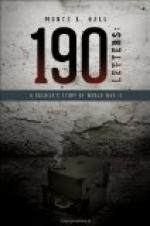I have just seen that Charles Peguy died at the beginning of the war. How terribly French thought will have been mown down! What surpasses our understanding (and yet what is only natural) is that civilians are able to continue their normal life while we are in torment. I saw in the Cri de Paris, which drifted as far as here, a list of concert programmes. What a contrast! However, mother dear, the essential thing is to have known beauty in moments of grace.
The weather is frightful, but one can feel the coming of spring. At a time like this nothing can speak of individual hope, only of great general certainties.
January 19.
We have been since yesterday in our second line positions; we came to them in marvellous snow and frost. A furious sky, with charming rosy colour in it, floated over the visionary forest in the snow; the trees, limpid blue low down, brown and fretted above, the earth white.
I have received two parcels; the Chanson de Roland gives me infinite pleasure—particularly the Introduction, treating of the national epic and of the Mahabharata which, it seems, tells of the fight between the spirits of good and evil.
I am happy in your lovely letters. As for the sufferings which you forebode for me, they are really very tolerable.
But what we must recognise, and without shame, is that we are a bourgeois people. We have tasted of the honey of civilisation—poisoned honey, no doubt. But no, surely that sweetness is true, and we should not be called upon to make of our ordinary existence a preparation for violence. I know that violence may be salutary to us, especially if in the midst of it we do not lose sight of normal order and calm.
Order leads to eternal rest. Violence makes life go round. We have, for our object, order and eternal rest; but without the violence which lets loose reserves of energy, we should be too inclined to consider order as already attained. But anticipated order can only be a lethargy which retards the coming of positive order.
Our sufferings arise only from our disappointment in this delay; the coming of true order is too long for human patience. In any case, however suffering, we would rather not be doers of violence. It is as when matter in fusion solidifies too quickly and in the wrong shape: it has to be put to the fire again. This is the part violence plays in human evolution; but that salutary violence must not make us forget what our aesthetic citizenship had acquired in the way of perdurable peace and harmony. But our suffering comes precisely from the fact that we do not forget it!




